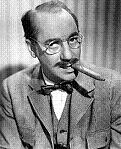




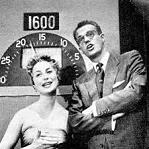
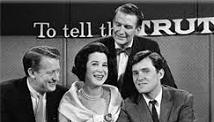
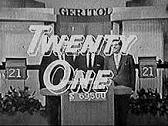
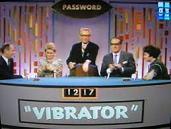
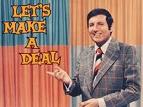

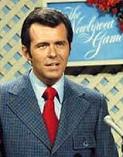
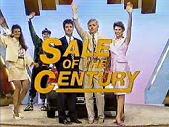













TLW's TV Gameshowscope™ (Game Show Historyscope) |
By T.L. Winslow (TLW), the Historyscoper™ |
© Copyright by T.L. Winslow. All Rights Reserved. |
Original Pub. Date: Oct. 26, 2015. Last Update: Apr. 12, 2019. |
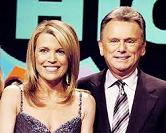


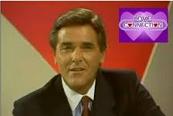
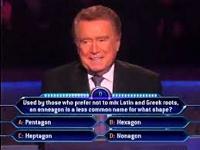
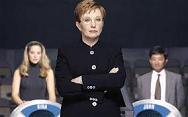
Westerners are not only known as history ignoramuses, but double dumbass history ignoramuses when it comes to TV game shows and TV game show history. Since I'm the one-and-only Historyscoper (tm), let me quickly bring you up to speed before you dive into my Master Historyscope.

On June 20, 1946 Cash and Carry debuts on the DuMont TV Network (until July 1, 1947), hosted by and Jersey City, N.J.-born Dennis James (Demie James Sposa) (1917-97), becoming the first network TV game show, in which contestants take cans off a supermarket shelf and answer the question on it; of course the cans are all made by sponsor Libby Foods.

On Oct. 27, 1947 You Bet Your Life, starring Julius Henry "Groucho" Marx (1890-1977) debuts on ABC Radio, moving to CBS Radio on Oct. 5, 1949; on Oct. 4, 1950 it becomes an NBC-TV show (until 1961), with a combined total of 529 episodes, becoming the first TV game show to have its reruns syndicated; every episode has a secret word; the intro features the song Hooray for Captain Spaulding from the 1928 Broadway musical "Animal Crackers"; on Feb. 18, 1954 Groucho takes on a spunky old lady (secret word = "clock").
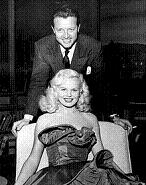
On Nov 13, 1947 Pantomime Quiz (originally Pantomime Quiz Time), based on the parlor game Charades debuts on KTLA-TV (ends Oct. 9, 1959), hosted by Mike Stokey (1918-2003), winning the first Emmy Award for most popular TV program, moving to CBS-TV in Oct. 1949-Aug. 28, 1951, NBC-TV on Jan. 2-Mar. 26, 1952, CBS-TV on July 4-Aug. 28, 1952, DuMont Network on Oct. 20, 1953-Apr. 13, 1954, CBS-TV on July 9-Aug. 2, 1954, ABC-TV on Jan. 22-Mar. 6, 1955, CBS-TV on July 8-Sept. 6, 1957, and ABC-TV on Apr. 8, 1958-Oct. 9, 1959; on Sept. 17, 1962-Sept. 2, 1964 it returns to CBS-TV as "Stump the Stars"; in Jan.-Sept. 1979 it is syndicated as "Celebrity Charades".

On July 1, 1948 after years of experimental broadcasts, the U.S. Federal Communications Commission (FCC) approves commerical TV broadcasts; New York City station WNBT (later WNBC) becomes the first to make the changeover, hosting a 1-time episode of Truth of Consequences (which debuted on NBC Radio on Mar. 23, 1940), hosted by producer Ralph Livingstone Edwards (1913-2005), featuring impossible-to-answer trivia questions followed by Beulah the Buzzer, and the "consequences", a zany and embarrassing stunt, often involving reunion with a loved one; after a 1-time special on NBC-TV on July 1, 1948, it debuts again on Sept. 7, 1950 (until Dec. 31, 1987), becoming the first TV program with a live audience to be recorded on 35mm film with multiple cameras; in 1954 Edwards is replaced by Jack Bailey, followed in 1956 by Bob Barker, in 1977 by Bob Hilton, and in 1987 by Larry Anderson; on Jan. 22, 1957 it becomes the first TV program to be broadcast in all U.S. time zones from a videotape; in 1966 it becomes the first successful daily game show in first-run syndication (until 1978, then 1987-8); on Mar. 31, 1950 Hot Springs, N.M. (founded 1916) renames itself Truth or Consequences, N.M. (modern-day pop. 6K) to get Edwards to host the show there, after which he attends the annual fiesta the first weekend of every May until his death.
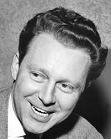
On July 4, 1949 the daytime talk and quiz show Headline Clues debuts on DuMont Network, which launches a nighttime quiz show version on July 20, hosted by George Putnam (1914-2008), adding "Broadway to Hollywood" to the title; the daytime show ends on May 4, 1951, and the nighttime show ends on July 15, 1954.
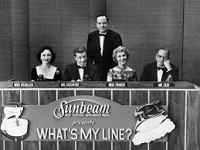
On Feb. 2, 1950 What's My Line debuts on CBS-TV (until Sept. 3, 1967, then revived as a syndicated show from 1968-75), produced by Mark Goodson (1915-92) and William S. "Bill" Todman (1916-79), and hosted by South African-born ABC-TV newsman John Charles Daly (1914-91), with mystery guests whose occupation (line) must be guessed by a panel consisting of gold necklace-wearing Arlene Francis (1907-2001) (1950-75), Dorothy Kilgallen (1913-65) (1950-65), Louis Untermeyer (1885-1977) (1950-1), Random House ed. Bennett Cerf (1898-1971) (1951-71) et al.; the first mystery guest is Yankees shortstop Phil "Scooter" Rizzuto (1917-2007) - I make money with bags and balls in New York?

On Mar. 23, 1950 the Goodson-Todman Productions game show Beat the Clock debuts on CBS-TV, switching to ABC-TV from 1958-61, hosted by Bud Collyer (1908-69); Neil Simon writes for it, and James Dean tests stunts for it.
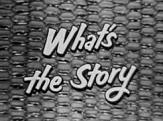
On June 25, 1951 the game show What's the Story debuts on DuMont Network (until Sept. 23, 1955), hosted by Walter Rainey, Walter Kiernan, Al Capp, and John McCaffery, with celebs asked to identify famous events from clues, becoming the last series to air on the DuMont Network.
On July 2, 1953 Place the Face debuts on NBC-TV, followed on Mar. 18, 1954 by CBS-TV, then back to NBC-TV in July 1954 (until Sept. 13, 1955), hosted by Jack Smith, Jack Bailey, and Bill Cullen (Feb. 11, 1954).

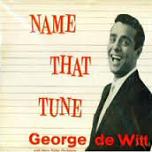
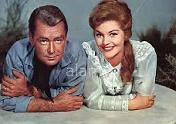
On July 6, 1953 after debuting on NBC Radio in 1952, the quiz show Name That Tune debuts on CBS-TV (until Oct. 19, 1959), hosted by Red Benson (until June 1954), William Lawrence Francis "Bill" Cullen (1920-90) (Sept. 1954-Mar. 1955), and singer-comedian George DeWitt (Florentine) (1922-79) (Sept. 1955-) (known for impersonating Rochester at the 500 Club in Atlantic City, N.J. while Sammy Davis Jr. impersonates Jack Benny), who makes it a hit with his good looks and singing ability; meanwhile his ex-wife (1951-5) Claire Kelly (Claire Ann Green) (1934-98) uses her new freedom to become a hot property in Hollywood before semi-retiring to marry wealthier men.



On June 7, 1955 the TV quiz show The $64,000 Question, emceed by Hal March (1920-70) and sponsored by Revlon debuts on CBS-TV (until Nov. 2, 1958); questions are written by prof. Bergen Baldwin Evans (1904-78); a new Cadillac is the consolation prize to those missing the big money question; New York City-born psychologist Dr. Joyce Brothers (1927-) wins in the category of boxing, Barbara Feldon (1933-) for Shakespeare; too bad, the 1958 TV Quiz Show Scandal causes it to be cancelled, after which March is out of work for a decade, then dies of lung cancer; Brothers is permitted to be the first-ever woman boxing color commentator for CBS-TV during the match between Sugar Ray Robinson and Carmen Basilio, and in Aug. 1958 becomes the first TV psychologist.

On Sept. 12, 1956 the quiz show Twenty One debuts on CBS-TV (until Oct. 16, 1958), later becoming notorious for being rigged; basis of the 1994 Robert Redford film Quiz Show.

On Dec. 18, 1956 the Goodson-Todman Productions game show To Tell the Truth debuts on CBS-TV (until 1968), hosted by Bud Collyer, with a panel of four celebs attempting to guess which of three challengers is whom they claim to be, while only one of them swears to tell the truth; God appears on the Sept. 9, 1958 show.
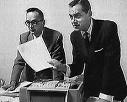



In Aug. 1958 the 1958 TV Quiz Show Scandal begins after nerdy CCNY student Herbert Milton "Herb" Stempel (1926-), who had won $49.5K on the TV game show (which debuted Sept. 12, 1956) Twenty One tells the New York World-Telegram and Sun and Manhattan District Atty. Frank Hogan that the show is a fake, that the answers are given in advance, and that he had been ordered to take a dive and lose to handsome, well-heeled Columbia U. prof. Charles Lincoln Van Doren (1926-2019) (son of Columbia prof. Mark Van Doren) in front of 25M TV viewers because the latter brings in bigger audiences; after testimony in front of a New York grand jury by Stemple and Edward H. "Ed" Hilgemeier Jr. (1933-75) (contestant in July 1958), Van Doren testifies, denying everything, causing Judge Mitchell Schweitzer to impound the record on the ground that it contains unproven accusations against an Am. hero; outside the jury room Van Doren tells the press that he played "honestly... At no time was I coached or tutored"; meanwhile contestant James Snodgrass produces registered letters mailed before the programs were aired containing the questions and answers, causing the House Committee on Legislative Oversight to become interested, and the show to air its last episode on Oct. 16, ruining the careers of producer Daniel "Dan" Enright (Ehrenreich) (1917-92) and host Jack Barry (Barasch) (1918-84), who finally make a comeback in 1972 with "The Joker's Wild". In Oct. 1959 the House Subcommittee on Legislative Oversight subpoenas Charles Van Doren after he wires them with a denial of all charges but refuses to appear voluntarily; he hides for six days, then on Oct. 14 accepts a subpoena in New York City's Roosevelt Hotel in front of a packed news conference; on Nov. 2 he comes clean in front of the House Committee on Foreign and Interstate Commerce, admitting that he had been given answers in advance to win $129K in 14 weeks, but that he went along "because it was having such a good effect on the national attitude toward teachers, education, and the intellectual life"; Van Doren is dismissed from Columbia U., and fired from NBC, but 75% of the Am. people back him up, and chmn. Oren Harris compliments him on his candor; Van Doren and 13 other celebs. are indicted in New York City for perjury; disc jockey Dick Clark admits that he chooses records based on "payola", claiming that any attempted regulation would "tamper with our cherished freedom of speech"; he is backed up by FCC chmn. John C. Doerfer, but when it is revealed that he also accepted payola from a big broadcaster he resigns.
On Jan. 4, 1959 (Sun.) (p.m.) the series GE College Bowl debuts on CBS-TV (until 1963, then on NBC-TV until June 14, 1970), presented by Allen Ludden (1959-62) and Robert Earle (1962-70), featuring college student teams competing for scholarships; Northwestern beats Brown.

On Oct. 2, 1961 (Mon.) the Goodson-Todman game show Password debuts on CBS-TV for 1,555 episodes (until Sept. 15, 1967), followed by 1,099 episodes on ABC-TV from Apr. 5, 1971-June 27, 1975, hosted by Allen Ellsworth Ludden (1917-81); it switches to color in the 1966-7 season.

On Dec. 30, 1963 the TV costume game show Let's Make a Deal, starring Winnipeg, Canada-born emcee Monty Hall (Halparin) (1921-2017) debuts on NBC-TV (until ?), switching to ABC-TV in 1968 and going into syndication in 1971.

On Mar. 30, 1964 (Mon.) after Julann Elizabeth Griffin (nee Wright) (1929-), wife of former $100-a-week San Francisco radio singer Mervyn Edward "Merv" Griffin Jr. (1925-2007) suggested to him a year earlier that a way to get around the bad name quiz shows have is to give contestants the answer on screen and have them guess the question, he launches What's the Question, later renamed to Jeopardy! (quotes mandatory?) on NBC-TV (until Jan. 3, 1975), becoming the king of TV shows for trivia buffs and epeolatrists (word worshippers), with its first ($100) question being about rats coming to America on Columbus' ships; after wise real estate investments Merv becomes the richest Hollywood performer in history by the late 1980s; it goes on to become the longest-running TV game show (until ?) - of course, they could give the questions in advance too?
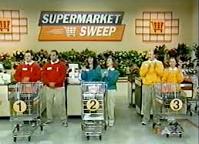
On Dec. 20, 1965 the game show Supermarket Sweep debuts on ABC-TV for 1,111 episodes (until July 14, 1967), broadcast from Food Fair supermarkets in the New York City area and hosted by Bill Malone; after a team-based quiz show, there is a timed race through the supermarket where each team tries to fill their shopping cart with the most valuable items; well-fed America flaunts its abundance and makes a game of overconsumption and stuffing carts full of hams, steaks, and turkeys; "The TV game show that travels to your home town and lets you run wild through your supermarket" - and they wonder why all them illegal aliens wanna sneak over the border from hungry countries?

On July 11, 1966 the daytime quiz show The Newlywed Game debuts on ABC-TV (until 1974, going into syndication in 1977-80, returning to ABC-TV in 1984, returning to syndication in 1985-9, 1996-9, then switching to GSN in 2009-Feb. 4, 2013), with host Robert Leland "Bob" Eubanks (1938-), who becomes known for the phrase "Makin' Whoopee" as a eubankism, er, euphemism for having sex; one infamous show features the question "Where is the strangest place you ever had the urge to make whoopee?", to which one bride answers "My ass".


On Oct. 17, 1966 the daytime game show The Hollywood Squares debuts on NBC-TV (until June 20, 1980), hosted by Peter Marshall (1927-), featuring a giant tic-tac-toe board with a Hollyweird star in each square, with players having to agree or disagree with the answer to a question, which is often a bluff, but often isn't since the questions usually are in the celeb's area of expertise; super-funny alcoholic closet gay comedian Paul Edward Lynde (1926-82) (whose 24-y.-o. lover James "Bing" Davidson died after falling from the window of their room at Sir Francis Drake Hotel in San Francisco last year) becomes a hit and takes over center square on Oct. 14, 1968; it moves to ABC-TV in 1976; "Paul, can you get an elephant drunk? Yes, but he still won't go up to your apartment."

On Sept. 29, 1969 the TV game show Sale of the Century debuts on NBC-TV (until July 13, 1973 and Jan. 3, 1983-Mar. 24, 1989), hosted by "Bart Maverick" actor John Augustus "Jack" Kelly (1927-92), followed in 1971 by Joseph Henry "Joe" Garagiola (1926-), and in 1983 by Jim Perry (James Edward Dooley) (1933-); it goes into syndication in Sept. 1973-Sept. 1974 and Jan. 7, 1985-Sept. 12, 1986.
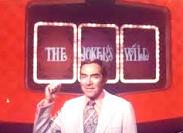
On Sept. 4, 1972 the TV game show The Joker's Wild debuts on CBS-TV (until June 13, 1975, folloed by syndication in Sept. 1977-May 23, 1986 and Sept. 10, 1990-Mar. 8, 1991), starring Jack Barry (Barasch) (1918-84) in his comeback from the 1958 TV Quiz Show Scandal.
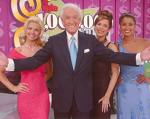
On Sept. 4, 1972 the TV game show The Price Is Right debuts on CBS-TV (until ?), hosted by Robert William "Bob" Barker (1923-) (until June 15, 2007), followed on Oct. 15, 2007 by Drew Allison Cary (1958-) (until ?), with its signature line "Come on down!", becoming the #1 game show of all time (until ?).
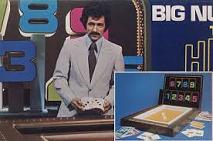
On July 1, 1974 the game show High Rollers debuts on NBC-TV (until June 11, 1976, then Apr. 24, 1978-June 20, 1980) hosted by Alex Trebek, "the Man with the Action"; on Sept. 14, 1987-May 27, 1988 it returns, hosted by Wink Martindale.

On Jan. 6, 1975 Merv Griffin's daytime game show Wheel of Fortune debuts on NBC-TV (until June 30, 1989), with Charles Herbert "Chuck" Woolery (1941-) and Susan Stafford (Susan Gail Carney) (1945-) as co-hosts; too bad, the show concentrates on shopping, with the game in the background, and its format isn't changed until Dec. 1981, with new hosts Pat Sajak (Patrick Leonard Sadjak) (1946-) and Vanna White (Vanna Marie Rosich) (1957-), after which it goes on to become a stellar prime-time hit, going into syndication on Sept. 19, 1983 (until ?).
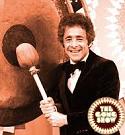
On June 14, 1976 Chuck Barris' talentless amateur talent contest show The Gong Show debuts on NBC-TV for 501 episodes (until Sept. 15, 1989 after going into syndication in 1976), hosted by Charles Hirsch "Chuck" Barris (1929-), featuring an absurdist style and humor incl. ridiculous and/or worthless prizes.

On July 12, 1976 the Goodson-Todman game show Family Feud debuts on daytime ABC-TV (until ?), hosted (until June 14, 1985) by Richard Dawson (Colin Lionel Emm) (1932-), featuring the Moseleys v. the Abramowitzes; "Survey says"; in 2001 a Mexican version called 100 Mexicanos Dijeron (Span. "100 Mexicans Say") debuts in Mexico City (until 2005).
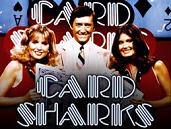
On Apr. 24, 1978 the Goodson-Todman game show Card Sharks, based on the card game Acey Deucey debuts on NBC-TV (until Oct. 23, 1981), hosted by Jim Perry (James Edward Dooley) (1933-), followed by CBS-TV on Jan. 6, 1986-Mar. 31, 1989, hosted by Bob Eubanks before going into syndication on Sept. 8, 1986-Sept. 11, 1987, hosted by Bill Rafferty, and again on Sept. 17, 2001-Jan. 11, 2002, hosted by Pat Bullard.

On Sept. 19, 1983 (Mon.) the TV game show Love Connection debuts in syndication for 2,425 episodes (until July 1, 1994, then Sept. 21, 1998-June 4, 1999), hosted by Charles Herbert "Chuck" Woolery (1941-), featuring contestants who have gone on a blind date, with the audience allowed to vote on their choice.
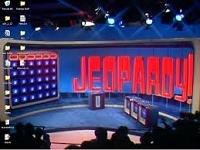
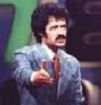

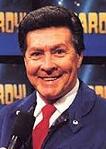
On Sept. 10, 1984 Merv Griffin's new revamped TV game show Jeopardy!, hosted by Canadian Ukrainian-French emcee Alex Trebek (1940-) (from Sudbury, Ont., not Montreal, Quebec) debuts on ABC-TV (he also produces); the first mustachioed TV game show host since Groucho Marx; Johnny Gilbert (1924-) is the announcer; the show goes on to become the greatest game show of all time, a Medieval worthiness test like jousting, a whole body-soul experience, covering the ever-growing globe of knowledge while always staying near the surface, with no two shows ever the same, as fresh as last week's news yet liable to cover anything back to the beginning of the Great Track of Time; the contestants get to become King of the World for a shining moment; becoming a five-time winner is an experience savored for life, validating one's entire existence, and better than winning a Pulitzer Prize for bragging rights at the bar?; it takes until Mar. 16, 2007 for a 3-way tie to occur.
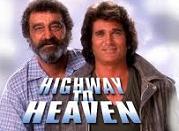
On Sept. 19, 1984 Highway to Heaven debuts on NBC-TV for 111 episodes (until Aug. 4, 1989), starring Michael Landon as Jonathan Smith, an angel send down to Earth on probation, and Victor French as his human partner-friend Mark Gordon, who are given assignments by the Boss to use their humanity and "the Stuff" to help troubled souls by assuming false identities in various cities.

On Sept. 4, 1998 Who Wants to Be a Millionaire? debuts on ITV in the U.K., hosted by Christopher John "Chris" Tarrant (1946-) (until Feb. 11, 2014), reaching 19M viewers; on Aug. 16, 1999 the U.S. version debuts, hosted by Regis Francis Xavier Philbin (1931-), becoming the #1 TV show of 1999-2000, with 29M viewers, ending on June 27, 2002, after which a daily syndicated version debuts on Sept. 16, 2002, hosted by Meredith Louise Vieira (1953-) (until May 2013); on July 7, 2010 a federal jury in Riverside, Calif. awards creator Celador Internat. $269.2M in damages, incl. $9.2M for sale of merchandise after it sues the Walt Disney Co.

On Aug. 14, 2000 the quiz show The Weakest Link debuts on BBC-TV for 1,693 episodes (until Mar. 31, 2012), hosted by Anne Josephine Robinson (1944-).

On Nov. 2, 2004 the 40-y.-o. TV quiz show Jeopardy! holds its 4000th episode, featuring emcee Alex Trebek (1940-) and announcer Johnny Gilbert (1924-); since changing its rules allowing unlimited appearances to the winner in 2003, after making his first appearance on June 2, 30-y.-o. Edmonds, Wash.-born Mormon software engineer of Holladay, Utah (the state that's 65% Mormon) Kenneth Wayne "Ken" Jennings III (1974-) ("nerd") ("smarmy") ("peronality of a hall monitor") (resembles a white prick in a suit with the face of Mel Gibson pasted on?) (B.S. in computer science and English at BYU) rakes in $2M+ in earnings by this date, then ups his total to $2,197K, making him the biggest game show winner in TV history (later falling to #1 behind Brad Rutter), the hoopla boosting the show's ratings 22% to #1 among syndicated TV shows; on Nov. 3 (his 66th appearance) he wins a single game record $75K; on Nov. 30 he finally loses in his 75th appearance after winning $2,520,700 (10% of which he gives straight to the Mormon Church) and giving 2.7K correct responses when 48-y.-o. Ventura, Calif. real estate agent Nancy Zerg (1956-) beats him in Final Jeopardy on a question about income tax prep. service H&R Block: "This company has 70K employees, most of which only work 4 mo. of each year"; he guesses Federal Express (and later says that he does his own taxes, meaning the Mormon Church does them to make sure they get all of their 10%?), losing $5601 of his $14,400, leaving $8799, while Zerg bets $4401 of her $10K, giving $14,401; if he hadn't flubbed an easy Double Jeopardy question about Nutsy Bastogne, he wouldn't have lost $5.4K, and if he hadn't flubbed another easy one about cloche hats, he wouldn't have lost another $4.8K, and thus had a shutout game; she loses on her next appearance (Dec. 1) to Katie Fitzgerald; lucky for Ken, losing on a question about a major corp., with a wrong answer giving the name of another major corp., he later makes more moolah by doing ads for both, and gets free income tax prep service for life from H&R Block.